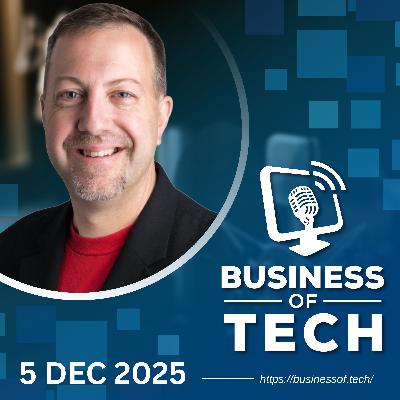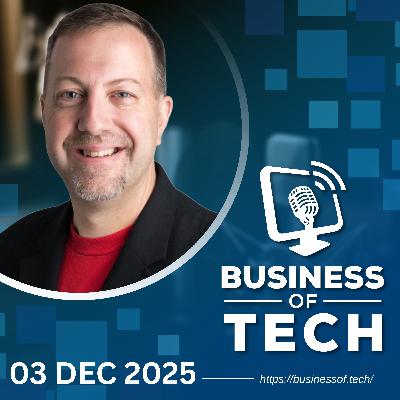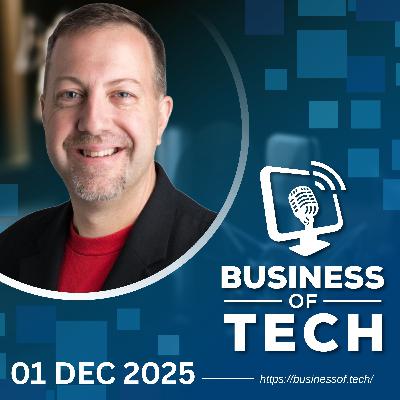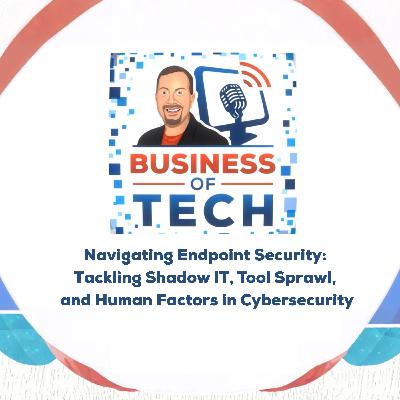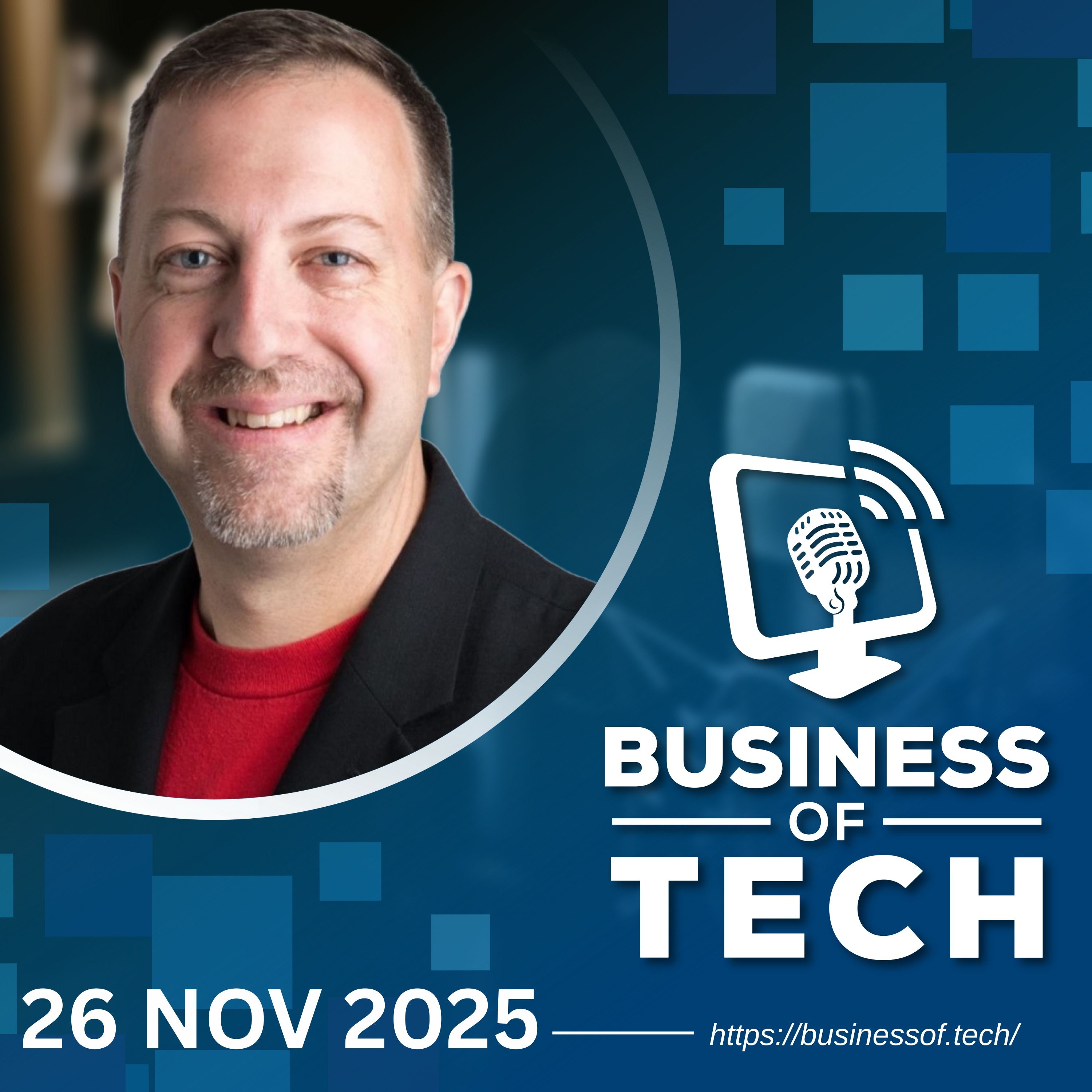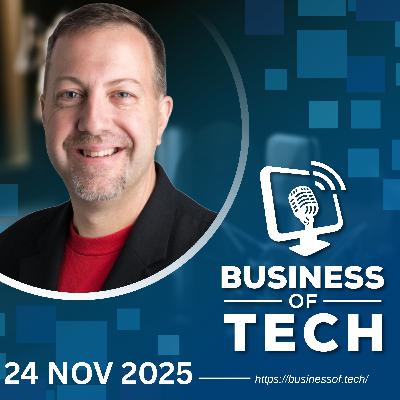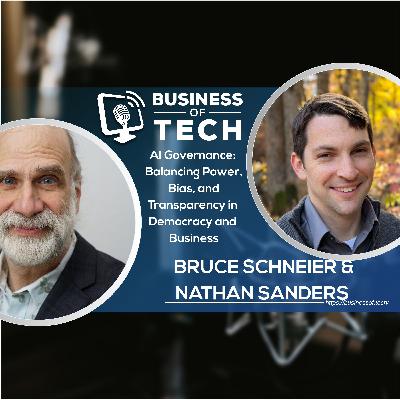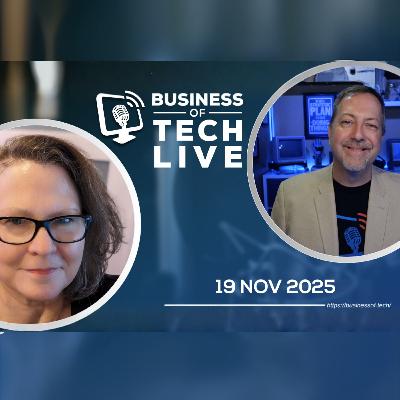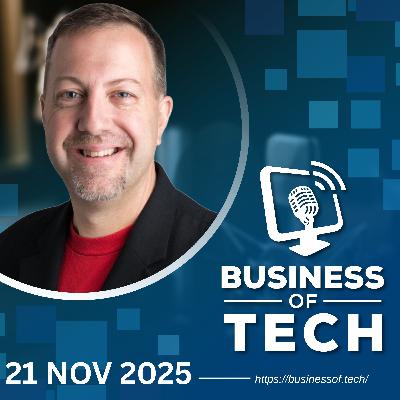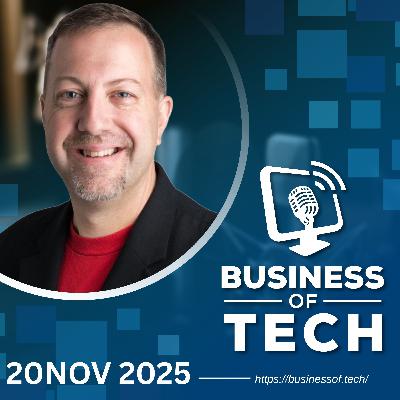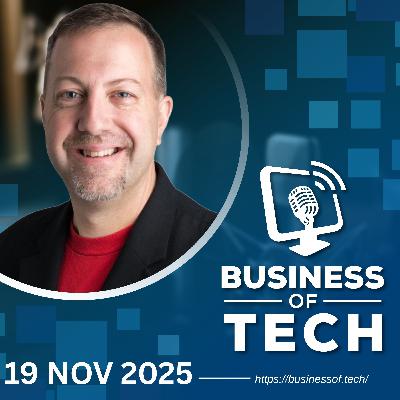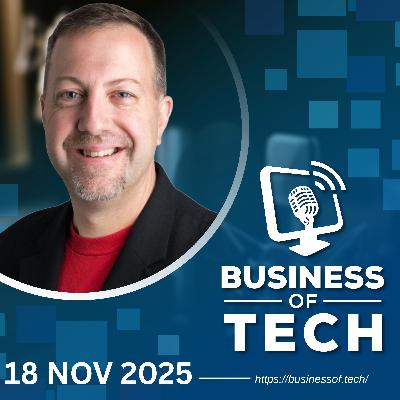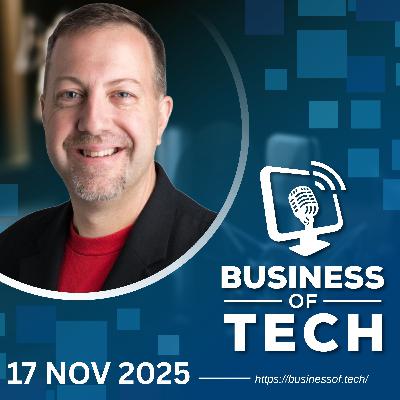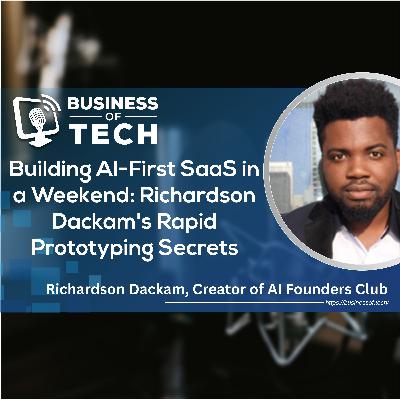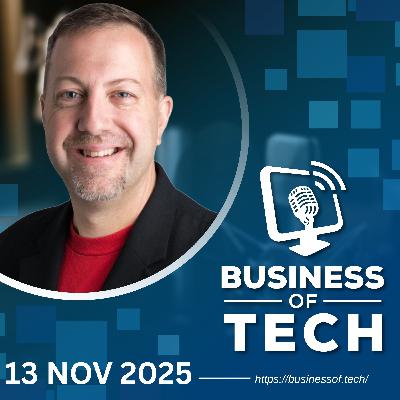Discover Business of Tech: Daily 10-Minute IT Services Insights
Business of Tech: Daily 10-Minute IT Services Insights

Business of Tech: Daily 10-Minute IT Services Insights
Author: Dave Sobel
Subscribed: 136Played: 19,230Subscribe
Share
© Copyright 2019-2024 MSP Radio
Description
In 10 minutes daily, The Business of Tech delivers the latest IT services and MSP-focused news and commentary. Curated to stories that matter with commentary answering 'Why Do We Care?', channel veteran Dave Sobel brings you up to speed and provides resources to go deeper. With insights and analysis, this focused podcast focuses on the knowledge you need to be effective, profitable, and relevant.
1824 Episodes
Reverse
The integration of advanced AI capabilities in tools like OpenAI Atlas and Microsoft Teams has raised significant security concerns, particularly regarding identity and trust vulnerabilities. Recent findings from LayerX indicate that the Atlas browser has critical vulnerabilities that could allow attackers to inject harmful instructions, while Microsoft Teams has a flaw that enables attackers to bypass Microsoft Defender protections through guest access. These issues highlight the fragility of AI integrations and the need for organizations to implement strict B2B collaboration configurations to mitigate risks associated with external collaborations.The FBI has reported over $262 million in losses due to account takeover fraud, with more than 5,100 complaints filed this year. Cybercriminals are increasingly using social engineering tactics to gain unauthorized access to online banking accounts, often changing passwords to lock victims out and quickly transferring funds to cryptocurrency wallets, complicating recovery efforts. The FBI advises individuals to monitor their financial accounts closely and adopt security measures such as complex passwords and multi-factor authentication to protect against these threats.Managed Service Providers (MSPs) are experiencing a growing demand for integrated security solutions, with a recent survey indicating that 92% of MSPs are seeing business growth driven by interest in AI. However, less than half feel prepared to guide clients in deploying AI tools, particularly autonomous agents. This gap in readiness reflects a significant drop from the previous year's 90% preparedness figure, emphasizing the need for MSPs to focus on data governance and security before implementing AI solutions.The episode underscores the importance of managing identity and data governance as the primary control mechanisms in modern security. MSPs that prioritize these areas will be better positioned to offer secure collaboration and effective automation. As the landscape evolves, providers must choose tools that enhance service delivery without adding unnecessary complexity, ensuring they can meet client demands for security and efficiency in an increasingly AI-driven environment.
💼 All Our SponsorsSupport the vendors who support the show:👉 https://businessof.tech/sponsors/ 🚀 Join Business of Tech PlusGet exclusive access to investigative reports, vendor analysis, leadership briefings, and more.👉 https://businessof.tech/plus 🎧 Subscribe to the Business of TechWant the show on your favorite podcast app or prefer the written versions of each story?📲 https://www.businessof.tech/subscribe 📰 Story Links & SourcesLooking for the links from today’s stories?Every episode script — with full source links — is posted at:🌐 https://www.businessof.tech 🎙 Want to Be a Guest?Pitch your story or appear on Business of Tech: Daily 10-Minute IT Services Insights:💬 https://www.podmatch.com/hostdetailpreview/businessoftech 🔗 Follow Business of Tech LinkedIn: https://www.linkedin.com/company/28908079YouTube: https://youtube.com/mspradioBluesky: https://bsky.app/profile/businessof.techInstagram: https://www.instagram.com/mspradioTikTok: https://www.tiktok.com/@businessoftechFacebook: https://www.facebook.com/mspradionews Hosted by Simplecast, an AdsWizz company. See pcm.adswizz.com for information about our collection and use of personal data for advertising.
Microsoft has announced a price increase for its Office productivity software subscriptions, set to take effect on July 1, 2026. The Microsoft 365 Business Basic subscription will rise from $6 to $7 per user per month, while the Business Standard subscription will increase from $12.50 to $14. Additionally, the Microsoft 365 E3 enterprise subscription will see a 13% hike from $23 to $26. This adjustment follows a period of infrequent price changes since the launch of Office 365 in 2011 and reflects Microsoft's significant investment in its platform, which has introduced over 1,100 new features in the past year. Managed Service Providers (MSPs) should prepare for customer pushback regarding these increases, as clients may direct their frustrations toward their service providers rather than Microsoft.In related developments, several companies have announced product updates aimed at simplifying user experiences. Nerdio has enhanced its enterprise platform to support Azure Virtual Desktop in hybrid environments, while Coro has released version 3.7 of its cybersecurity platform, which features a redesigned interface for improved management. Comcast Business has also upgraded its internet services for small businesses, offering faster speeds and enhanced reliability. These updates indicate a broader trend toward simplifying technology solutions, but they also introduce new governance risks that MSPs must address.The episode also highlights a shift in educational trends, with an increasing number of college students opting for artificial intelligence majors over traditional computer science degrees. This change is driven by concerns over job market prospects for computer science graduates. As universities adapt their curricula to meet the demand for AI skills, MSPs may face challenges in finding candidates who possess the necessary infrastructure knowledge to support business operations effectively.For MSPs and IT service leaders, these developments underscore the importance of proactive communication with clients regarding price changes and the value of technology investments. As tools become more automated and user-friendly, the need for robust governance and security measures becomes paramount. MSPs should focus on ensuring that their clients understand the implications of these changes and the necessity of maintaining foundational IT practices, particularly as the talent pipeline shifts toward AI-focused education. Four Things to Know Today:00:00 Microsoft’s 2026 M365 Price Hike Highlights Its Market Power—and Forces MSPs to Reframe Value With Customers03:14 Automation and Simplified Dashboards Dominate New Releases, but Experts Say MSPs Still Shoulder the Governance Burden06:54 AI Majors Surge as Computer Science Enrollment Falls, Reshaping the Tech Talent Pipeline08:55 MCP’s Rapid Adoption Outpaces Governance, Creating Opportunity—and Risk—for MSPs Managing AI Integration Sponsored by: https://scalepad.com/dave/https://getflexpoint.com/msp-radio/
💼 All Our SponsorsSupport the vendors who support the show:👉 https://businessof.tech/sponsors/ 🚀 Join Business of Tech PlusGet exclusive access to investigative reports, vendor analysis, leadership briefings, and more.👉 https://businessof.tech/plus 🎧 Subscribe to the Business of TechWant the show on your favorite podcast app or prefer the written versions of each story?📲 https://www.businessof.tech/subscribe 📰 Story Links & SourcesLooking for the links from today’s stories?Every episode script — with full source links — is posted at:🌐 https://www.businessof.tech 🎙 Want to Be a Guest?Pitch your story or appear on Business of Tech: Daily 10-Minute IT Services Insights:💬 https://www.podmatch.com/hostdetailpreview/businessoftech 🔗 Follow Business of Tech LinkedIn: https://www.linkedin.com/company/28908079YouTube: https://youtube.com/mspradioBluesky: https://bsky.app/profile/businessof.techInstagram: https://www.instagram.com/mspradioTikTok: https://www.tiktok.com/@businessoftechFacebook: https://www.facebook.com/mspradionews Hosted by Simplecast, an AdsWizz company. See pcm.adswizz.com for information about our collection and use of personal data for advertising.
Amazon Web Services (AWS) has made significant advancements in artificial intelligence (AI) at its reInvent event, introducing a new AI training chip, Trainium 3, which reportedly enhances performance for AI training and inference by up to four times while reducing energy consumption by 40%. Additionally, AWS launched new features in its Agent Core platform, allowing developers to set boundaries for AI agents and log user interactions. The introduction of customizable AI models through the new service, NovaForge, aims to make AI model development more accessible for businesses, addressing the high costs associated with creating models from scratch.Microsoft is facing challenges in selling its AI tools, with reports indicating a slowdown in customer adoption. Despite Microsoft’s assertion that it has not lowered sales quotas for AI products, the situation highlights a broader issue: customers are struggling to see the value in AI investments due to messy data, inconsistent processes, and unclear governance. This resistance suggests that while demand for AI exists, readiness among customers remains low, presenting an opportunity for IT service providers to facilitate the transition by offering readiness assessments and governance frameworks.Managed Service Providers (MSPs) are increasingly utilizing AI, with a survey indicating that 80% have adopted AI-powered chatbots, which have improved customer support. However, one-third of MSPs report challenges in implementing AI, including high costs and a lack of internal expertise. As client expectations regarding data security rise, MSPs are deploying AI-driven threat detection solutions. The survey results indicate a commitment to leveraging AI for business transformation, but the complexity of integrating AI into existing workflows remains a significant hurdle.The surge in demand for RAM, driven by the AI industry, has led to a 500% increase in memory prices, creating a shortage of consumer-grade memory. This situation mirrors previous GPU shortages and indicates that high-performance computing components are now subject to the purchasing power of major AI companies. MSPs must prepare for ongoing volatility in hardware costs and communicate these changes to clients, adjusting budgets and refresh cycles accordingly. The evolving landscape emphasizes the need for MSPs to adopt a structured approach to AI, ensuring they are not merely adding tools but effectively transforming their service offerings. Four things to know today00:00 AWS Expands Full-Stack AI Strategy From Chips to Private Regions, Raising Governance and Lock-In Stakes for MSPs07:38 Reports of AI Sales Friction at Microsoft Highlight Market Hesitation and Open the Door for MSP Readiness Services09:28 Survey Shows AI Adoption Surging Among MSPs, Yet Cost, Expertise, and Security Pressures Undercut True Transformation11:51 AI-Driven RAM Shortage Forces MSPs to Reforecast Budgets as Prices Spike 500%This is the Business of Tech. Supported by: https://mailprotector.com/mspradio/
💼 All Our SponsorsSupport the vendors who support the show:👉 https://businessof.tech/sponsors/ 🚀 Join Business of Tech PlusGet exclusive access to investigative reports, vendor analysis, leadership briefings, and more.👉 https://businessof.tech/plus 🎧 Subscribe to the Business of TechWant the show on your favorite podcast app or prefer the written versions of each story?📲 https://www.businessof.tech/subscribe 📰 Story Links & SourcesLooking for the links from today’s stories?Every episode script — with full source links — is posted at:🌐 https://www.businessof.tech 🎙 Want to Be a Guest?Pitch your story or appear on Business of Tech: Daily 10-Minute IT Services Insights:💬 https://www.podmatch.com/hostdetailpreview/businessoftech 🔗 Follow Business of Tech LinkedIn: https://www.linkedin.com/company/28908079YouTube: https://youtube.com/mspradioBluesky: https://bsky.app/profile/businessof.techInstagram: https://www.instagram.com/mspradioTikTok: https://www.tiktok.com/@businessoftechFacebook: https://www.facebook.com/mspradionews Hosted by Simplecast, an AdsWizz company. See pcm.adswizz.com for information about our collection and use of personal data for advertising.
AI-integrated tools, such as OpenAI's Atlas and Microsoft Teams, are introducing new trust and identity risks, particularly through vulnerabilities like prompt injections and guest access features. The Atlas browser, launched on October 21, 2025, has been identified as having security flaws that could allow attackers to inject harmful instructions. Similarly, Microsoft Teams has a vulnerability that permits attackers to bypass security protections when users join external tenants as guests. These developments highlight the fragility of AI integrations and the need for robust security measures in collaborative environments.The FBI has reported over $262 million in losses due to account takeover fraud schemes, with more than 5,100 complaints filed this year. Cybercriminals are employing social engineering tactics to gain unauthorized access to online banking and payroll accounts, often locking victims out by changing passwords. The FBI recommends that individuals monitor their financial accounts closely, use complex passwords, and enable multi-factor authentication to mitigate these risks. This trend underscores the importance of managing trust and identity in security practices, as attackers increasingly exploit human vulnerabilities rather than technical flaws.In the managed service provider (MSP) sector, a recent survey by OpenText Cybersecurity revealed that while 92% of MSPs are experiencing growth driven by interest in AI, fewer than half feel prepared to implement AI tools effectively. This marks a significant decline from the previous year's 90% readiness. Additionally, 71% of MSPs reported that their small and medium-sized business clients prefer bundled security solutions, indicating a shift towards integrated offerings that simplify decision-making for clients. The findings suggest that MSPs need to focus on data governance and readiness before deploying AI solutions.For MSPs and IT service leaders, the key takeaway is that modern security is increasingly about managing identity and data governance rather than merely adding more tools. As AI vulnerabilities and account takeover fraud become more prevalent, providers must prioritize establishing secure trust boundaries and effective data management practices. By doing so, MSPs can differentiate themselves in a competitive market, ensuring they are equipped to deliver secure AI solutions and meaningful automation to their clients. Three things to know today00:00 New AI, Collaboration, and Fraud Threats Underscore That Identity—not Infrastructure—is the Real Security Battleground05:15 Survey Shows MSPs Expanding Services Amid AI Interest, Yet True Opportunity Lies in Readiness and Governance07:45 New MSP Integrations, Funding, and AI Platforms Underscore the Shift Toward Identity and Data Governance as the True Control Plane This is the Business of Tech. Supported by: https://try.auvik.com/dave-switchhttps://scalepad.com/dave/
💼 All Our SponsorsSupport the vendors who support the show:👉 https://businessof.tech/sponsors/ 🚀 Join Business of Tech PlusGet exclusive access to investigative reports, vendor analysis, leadership briefings, and more.👉 https://businessof.tech/plus 🎧 Subscribe to the Business of TechWant the show on your favorite podcast app or prefer the written versions of each story?📲 https://www.businessof.tech/subscribe 📰 Story Links & SourcesLooking for the links from today’s stories?Every episode script — with full source links — is posted at:🌐 https://www.businessof.tech 🎙 Want to Be a Guest?Pitch your story or appear on Business of Tech: Daily 10-Minute IT Services Insights:💬 https://www.podmatch.com/hostdetailpreview/businessoftech 🔗 Follow Business of Tech LinkedIn: https://www.linkedin.com/company/28908079YouTube: https://youtube.com/mspradioBluesky: https://bsky.app/profile/businessof.techInstagram: https://www.instagram.com/mspradioTikTok: https://www.tiktok.com/@businessoftechFacebook: https://www.facebook.com/mspradionews Hosted by Simplecast, an AdsWizz company. See pcm.adswizz.com for information about our collection and use of personal data for advertising.
OpenAI has declared a "code red" as it faces intensified competition from companies like Google and Anthropic, prompting a shift in focus towards enhancing the capabilities of its ChatGPT platform. CEO Sam Altman has urged staff to prioritize improvements in speed, reliability, and personalization, delaying other initiatives such as advertising. This strategic pivot comes as OpenAI also announced an ownership stake in Thrive Holdings, a company that acquires and transforms service firms, particularly in accounting and IT, with the aim of integrating AI to improve operational efficiency.A recent study by Stebo Systems highlights a significant gap between Chief Information Officers' (CIOs) perceptions of their organizations' AI readiness and the actual state of their data management. While 91% of U.S. business leaders recognize the importance of customer data management, only 31% fully trust their data. The study reveals that 76% of organizations still rely on side spreadsheets to address data issues, indicating a lack of centralized data governance. This fragmentation leads to wasted time and lost revenue, underscoring the need for robust data governance frameworks as organizations aim to adopt AI-driven services.The episode also discusses the implications of surveillance AI, particularly a model developed by Securis Technologies that predicts and prevents crimes among inmates using data from prison phone calls. While the company claims success in disrupting criminal activities, concerns about civil liberties and the ethical use of such data have been raised. This situation serves as a cautionary tale for IT service providers, emphasizing the importance of establishing governance frameworks to mitigate risks associated with AI deployment in business environments.For Managed Service Providers (MSPs) and IT leaders, the key takeaway is the necessity of controlling their own AI strategies. As OpenAI integrates vertically into the service industry, independent MSPs must differentiate themselves by building their own AI capabilities and data governance practices. The episode stresses that without a solid data foundation, AI initiatives are likely to fail, and MSPs should focus on enhancing data quality and governance to ensure successful AI implementations and maintain client trust. Four things to know today 00:00 OpenAI Pauses Ads Amid “Code Red” While Buying Into MSP Rollup, Raising Platform–Competitor Concerns05:16 Leaders Say They’re Ready for AI — but Their Data Still Lives in Side Spreadsheets07:49 Securus Call-Monitoring AI Shows How Predictive Surveillance Could Spill Into Workplace Tools10:27 New AI Helpers and Simple M365 Assessments Raise the Bar for Modern IT Providers This is the Business of Tech. Supported by: https://getflexpoint.com/msp-radio/https://cometbackup.com/?utm_source=mspradio&utm_medium=podcast&utm_campaign=sponsorship
💼 All Our SponsorsSupport the vendors who support the show:👉 https://businessof.tech/sponsors/ 🚀 Join Business of Tech PlusGet exclusive access to investigative reports, vendor analysis, leadership briefings, and more.👉 https://businessof.tech/plus 🎧 Subscribe to the Business of TechWant the show on your favorite podcast app or prefer the written versions of each story?📲 https://www.businessof.tech/subscribe 📰 Story Links & SourcesLooking for the links from today’s stories?Every episode script — with full source links — is posted at:🌐 https://www.businessof.tech 🎙 Want to Be a Guest?Pitch your story or appear on Business of Tech: Daily 10-Minute IT Services Insights:💬 https://www.podmatch.com/hostdetailpreview/businessoftech 🔗 Follow Business of Tech LinkedIn: https://www.linkedin.com/company/28908079YouTube: https://youtube.com/mspradioBluesky: https://bsky.app/profile/businessof.techInstagram: https://www.instagram.com/mspradioTikTok: https://www.tiktok.com/@businessoftechFacebook: https://www.facebook.com/mspradionews Hosted by Simplecast, an AdsWizz company. See pcm.adswizz.com for information about our collection and use of personal data for advertising.
Small businesses in the U.S. are facing rising costs and job losses, with 70% of owners citing inflation as their primary concern, according to a recent Bank of America study. Despite this, 75% of small business owners remain optimistic about revenue growth in the coming year. However, the disparity in employment trends is stark, as small firms shed 88,000 jobs while larger companies gained 151,000. This economic environment is leading to a reduction in discretionary tech spending, as small businesses prioritize survival and cost control over technology investments.The global tech consulting market is projected to exceed $400 billion in revenue by 2026, driven by a surge in technology upgrades. A report indicates that 84% of buyers plan to upgrade their technology within the next year, with a notable increase in demand for consulting services. However, a significant number of personal computers are delaying upgrades to Windows 11, indicating a gap between modernization goals and actual implementation. This presents an opportunity for IT providers to position Windows 11 migration not merely as an OS upgrade but as essential for achieving desired business outcomes.In the hardware sector, Dell reported record revenues of $27 billion for the quarter ending October 31, 2025, largely attributed to its AI infrastructure business. Conversely, HP announced plans to cut 4,000 to 6,000 jobs as part of a restructuring initiative aimed at enhancing productivity through AI. Both companies are navigating challenges, including a projected memory shortage that could lead to increased prices in the second half of the fiscal year. These developments highlight the shifting dynamics in the tech industry, where AI is reshaping hardware strategies and vendor support is expected to diminish.For Managed Service Providers (MSPs) and IT decision-makers, the current economic landscape necessitates a strategic approach to technology investments. As small businesses tighten their budgets, IT providers must focus on demonstrating the financial impact of their solutions and offering flexible purchasing options. The convergence of rising consulting demand, hardware inflation, and vendor financial repositioning underscores the importance of aligning technology refresh cycles with business outcomes. By proactively addressing these challenges, MSPs can position themselves as essential partners in navigating the complexities of modernization and economic pressure. Four things to know today 00:00 SMB Costs Surge, Hiring Drops, and Confidence Splits—Forcing IT Providers to Tie Tech Directly to Business Value05:19 Everyone Says They Want Digital Transformation, but a Billion PCs Say Otherwise08:29 AI Server Demand Boosts Dell While HP Restructures and Warns of Memory Shortages, Pressuring SMB Refresh Cycles12:52 N-able Takes On More Debt — Here’s Why MSPs Should Pay Attention This is the Business of Tech. Supported by: https://saasalerts.com/mspradio/
💼 All Our SponsorsSupport the vendors who support the show:👉 https://businessof.tech/sponsors/ 🚀 Join Business of Tech PlusGet exclusive access to investigative reports, vendor analysis, leadership briefings, and more.👉 https://businessof.tech/plus 🎧 Subscribe to the Business of TechWant the show on your favorite podcast app or prefer the written versions of each story?📲 https://www.businessof.tech/subscribe 📰 Story Links & SourcesLooking for the links from today’s stories?Every episode script — with full source links — is posted at:🌐 https://www.businessof.tech 🎙 Want to Be a Guest?Pitch your story or appear on Business of Tech: Daily 10-Minute IT Services Insights:💬 https://www.podmatch.com/hostdetailpreview/businessoftech 🔗 Follow Business of Tech LinkedIn: https://www.linkedin.com/company/28908079YouTube: https://youtube.com/mspradioBluesky: https://bsky.app/profile/businessof.techInstagram: https://www.instagram.com/mspradioTikTok: https://www.tiktok.com/@businessoftechFacebook: https://www.facebook.com/mspradionews Hosted by Simplecast, an AdsWizz company. See pcm.adswizz.com for information about our collection and use of personal data for advertising.
The episode discusses the increasing complexity of endpoint security, driven by the rapid proliferation of devices due to remote work, BYOD policies, and the rise of shadow IT. Data indicates that shadow IT has surged by 59% since remote work became mainstream, with nearly half of cyberattacks linked to these unauthorized applications. Managed Service Providers (MSPs) are facing challenges in managing this expanded attack surface, as traditional security measures often fail to account for the multitude of devices and applications that employees use outside of corporate oversight.Panelists highlight that the lack of visibility and management of these endpoints creates significant blind spots, making organizations vulnerable to attacks. The conversation emphasizes the importance of understanding the various types of endpoints, including IoT devices and SaaS applications, which can often be overlooked. Additionally, the discussion touches on the role of human factors in security, noting that employees frequently bypass official channels to install their own tools, further complicating the security landscape.The episode also addresses the issue of tool sprawl, where MSPs may utilize an excessive number of security tools, leading to alert fatigue and operational inefficiencies. With some organizations reportedly using up to 40 different security solutions, the panelists argue for a more streamlined approach to security management. They suggest that consolidating tools can enhance efficiency and improve response times to incidents, ultimately benefiting both MSPs and their clients.For MSPs and IT service leaders, the key takeaway is the necessity of implementing a layered security strategy that includes comprehensive visibility, effective management of endpoints, and robust employee training. By prioritizing these elements, organizations can better protect themselves against the evolving threat landscape and ensure a more resilient operational framework.
💼 All Our SponsorsSupport the vendors who support the show:👉 https://businessof.tech/sponsors/ 🚀 Join Business of Tech PlusGet exclusive access to investigative reports, vendor analysis, leadership briefings, and more.👉 https://businessof.tech/plus 🎧 Subscribe to the Business of TechWant the show on your favorite podcast app or prefer the written versions of each story?📲 https://www.businessof.tech/subscribe 📰 Story Links & SourcesLooking for the links from today’s stories?Every episode script — with full source links — is posted at:🌐 https://www.businessof.tech 🎙 Want to Be a Guest?Pitch your story or appear on Business of Tech: Daily 10-Minute IT Services Insights:💬 https://www.podmatch.com/hostdetailpreview/businessoftech 🔗 Follow Business of Tech LinkedIn: https://www.linkedin.com/company/28908079YouTube: https://youtube.com/mspradioBluesky: https://bsky.app/profile/businessof.techInstagram: https://www.instagram.com/mspradioTikTok: https://www.tiktok.com/@businessoftechFacebook: https://www.facebook.com/mspradionews Hosted by Simplecast, an AdsWizz company. See pcm.adswizz.com for information about our collection and use of personal data for advertising.
A German court has ruled that OpenAI's training of its GPT-4 and GPT-4.0 models involved copyright infringement, requiring the company to disclose the frequency of usage of specific song lyrics in its training data. This ruling, initiated by GEMA, a German copyright collective, has significant implications for copyright holders, particularly in the music industry, as it may lead to financial benefits for artists from generative AI technologies. The decision contrasts with a recent UK case where StabilityAI successfully defended against similar claims, highlighting the ongoing complexities surrounding AI and intellectual property rights.In related developments, U.S. President Donald Trump has signed an executive order establishing the Genesis Mission, aimed at creating an integrated AI platform utilizing federal scientific datasets to enhance research in fields like biotechnology and quantum science. This initiative seeks to leverage U.S. supercomputers to automate experiment design and reduce discovery timelines. However, the episode suggests that this government initiative may not have immediate implications for MSPs, as it primarily represents a research project rather than a direct tool for business operations.The episode also discusses the rapid advancements in AI models, including Google's Gemini 3 and Anthropic's Opus 4.5, both of which have shown significant improvements in performance metrics. OpenAI plans to retire its GPT-4.0 model in February 2026, encouraging developers to transition to the newer GPT-5.1 series. These developments underscore the fast-paced nature of AI technology, where lifecycle management is becoming increasingly critical for organizations relying on these models.For MSPs and IT service leaders, the implications of these developments are profound. The German court ruling emphasizes the need for transparency in AI data handling practices, which may require MSPs to verify vendor compliance with copyright laws. Additionally, as AI models evolve rapidly, MSPs must adopt AI-agnostic architectures and prepare for potential disruptions caused by model obsolescence. The episode highlights the importance of establishing robust AI policies that promote accountability and ensure that organizations can effectively manage the risks associated with AI deployment. Three things to know today00:00 AI Accountability Tightens as German Court Orders OpenAI Transparency While U.S. Launches Federal AI Research Effort05:03 Model Upgrades Accelerate as Google, Anthropic, Microsoft, and OpenAI Push New Releases While Lifecycle Risks Mount for Users10:43 AI Policy Failures, Market Overheating, and Infrastructure Automation Collide in a Critical Moment for MSPs and Tech Leaders This is the Business of Tech. Supported by: https://cometbackup.com/?utm_source=mspradio&utm_medium=podcast&utm_campaign=sponsorship https://timezest.com/mspradio/
💼 All Our SponsorsSupport the vendors who support the show:👉 https://businessof.tech/sponsors/ 🚀 Join Business of Tech PlusGet exclusive access to investigative reports, vendor analysis, leadership briefings, and more.👉 https://businessof.tech/plus 🎧 Subscribe to the Business of TechWant the show on your favorite podcast app or prefer the written versions of each story?📲 https://www.businessof.tech/subscribe 📰 Story Links & SourcesLooking for the links from today’s stories?Every episode script — with full source links — is posted at:🌐 https://www.businessof.tech 🎙 Want to Be a Guest?Pitch your story or appear on Business of Tech: Daily 10-Minute IT Services Insights:💬 https://www.podmatch.com/hostdetailpreview/businessoftech 🔗 Follow Business of Tech LinkedIn: https://www.linkedin.com/company/28908079YouTube: https://youtube.com/mspradioBluesky: https://bsky.app/profile/businessof.techInstagram: https://www.instagram.com/mspradioTikTok: https://www.tiktok.com/@businessoftechFacebook: https://www.facebook.com/mspradionews Hosted by Simplecast, an AdsWizz company. See pcm.adswizz.com for information about our collection and use of personal data for advertising.
The United States, United Kingdom, and Australia have imposed sanctions on the Russian hosting provider MediaLand due to its facilitation of ransomware operations. MediaLand has been linked to various cybercrime activities, including support for groups like LockBit and BlackSuit, and has been identified as a provider for cybercrime marketplaces. The sanctions freeze assets within the U.S., U.K., and Australia and expose individuals engaging in transactions with MediaLand to potential enforcement actions. This shift towards a more offensive cybersecurity strategy, as articulated by National Cyber Director Sean Caroncross, aims to impose costs on adversaries targeting U.S. critical infrastructure, reflecting a recognition that current defensive measures are insufficient.In a related initiative, a coalition of chief security officers and former officials from the Cybersecurity and Infrastructure Security Agency (CISA) has launched a campaign to combat misleading cybersecurity advice, often referred to as "hack lore." This effort emphasizes practical measures such as patching, using strong passwords, and enabling multi-factor authentication, while debunking outdated myths that distract from real threats. The coalition's focus on evidence-based guidance aims to realign cybersecurity practices with effective strategies, which is particularly relevant during high-traffic shopping seasons.Additionally, Vectra AI has introduced the Vectra AI Shield for Microsoft, designed to enhance security across Microsoft environments. This solution addresses visibility gaps in existing Microsoft security tools, particularly concerning identity-based attacks. As identity becomes a focal point for cyber threats, the demand for platforms that simplify security management within the Microsoft ecosystem is increasing. This trend underscores the need for IT providers to adapt their security strategies to include comprehensive identity detection and management.For Managed Service Providers (MSPs) and IT leaders, these developments signal a critical shift in the cybersecurity landscape. The emphasis on government intervention and offensive strategies indicates that MSPs must prepare for increased reporting requirements and a focus on governance rather than solely on tools. By aligning with evidence-based practices and enhancing their understanding of identity security, MSPs can position themselves as trusted advisors, helping clients navigate the evolving cybersecurity landscape effectively. Four things to know today 00:00 Sanctions Hit a Russian Hoster While the U.S. Says It’s Time for a More Aggressive Cyber Approach04:58 Security Leaders Call Out “Hacklore” — and Say It’s Time to Drop Myths That Don’t Stop Attacks07:31 A New Identity Security Tool Hits Microsoft’s Ecosystem, and It Shows Where MSSPs Are Struggling Most09:44 NinjaOne Rolls Out MSP NXT — but MSPs Are Asking for Fewer Big Shows, Not More This is the Business of Tech. Supported by: https://try.auvik.com/dave-switchhttps://getflexpoint.com/msp-radio/
💼 All Our SponsorsSupport the vendors who support the show:👉 https://businessof.tech/sponsors/ 🚀 Join Business of Tech PlusGet exclusive access to investigative reports, vendor analysis, leadership briefings, and more.👉 https://businessof.tech/plus 🎧 Subscribe to the Business of TechWant the show on your favorite podcast app or prefer the written versions of each story?📲 https://www.businessof.tech/subscribe 📰 Story Links & SourcesLooking for the links from today’s stories?Every episode script — with full source links — is posted at:🌐 https://www.businessof.tech 🎙 Want to Be a Guest?Pitch your story or appear on Business of Tech: Daily 10-Minute IT Services Insights:💬 https://www.podmatch.com/hostdetailpreview/businessoftech 🔗 Follow Business of Tech LinkedIn: https://www.linkedin.com/company/28908079YouTube: https://youtube.com/mspradioBluesky: https://bsky.app/profile/businessof.techInstagram: https://www.instagram.com/mspradioTikTok: https://www.tiktok.com/@businessoftechFacebook: https://www.facebook.com/mspradionews Hosted by Simplecast, an AdsWizz company. See pcm.adswizz.com for information about our collection and use of personal data for advertising.
Cloud managed services are experiencing rapid growth, with the market projected to expand from approximately $50.62 billion in 2025 to $120 billion by 2035, reflecting a compound annual growth rate of 8.16%. This growth is driven by organizations across various sectors, including finance and healthcare, seeking to enhance their cloud operations and address cybersecurity risks. However, a widening performance gap among managed service providers (MSPs) is evident, as only the most capable firms are capitalizing on this demand. According to Service Leadership data, while the overall profitability of the MSP sector remains strong, not all providers are experiencing equal growth, raising concerns about competitive positioning.Recent surveys indicate that many businesses investing in artificial intelligence (AI) are not seeing financial returns, with only about 2% of Canadian business leaders reporting positive results from their generative AI investments. A study by KPMG highlights that many companies are still in the experimental phase of AI adoption, failing to integrate the technology effectively into their operations. Additionally, a significant skills gap exists among channel partners, with only 26% currently offering advanced network services with integrated AI capabilities. This disconnect between customer expectations and partner capabilities is contributing to the widening gap in performance.Frontline workers express concerns regarding the lack of transparency in AI integration within their workplaces. A survey conducted by Deputy found that while nearly half of workplaces utilize AI, only 25% of workers report regular interaction with it, and many are unaware of its usage. This communication gap can lead to mistrust and confusion among employees, which may hinder successful AI adoption. Despite these concerns, a majority of workers report satisfaction with AI's role in their tasks, indicating potential for positive outcomes if communication improves.For MSPs and IT service leaders, the current landscape presents both challenges and opportunities. The demand for cloud, AI, and managed services is surging, but success will depend on the ability to operationalize these technologies effectively. Providers must focus on enhancing their capabilities, improving communication with clients, and ensuring that they deliver measurable outcomes. As the market differentiates between high performers and those lagging behind, it is crucial for MSPs to adapt and evolve their services to meet the growing expectations of their clients. Three things to know today00:00 Cloud Demand Surges, CEO Priorities Shift, and MSP Performance Splits Into Clear Winners and Laggards05:40 Studies Show AI Investment Outpacing Capability, Leaving Firms Without ROI and Partners Struggling to Deliver10:00 AI Rollout Outpaces Employer Transparency, Creating Worker Confusion and Risk for IT Providers This is the Business of Tech. Supported by: https://mailprotector.com/mspradio/
💼 All Our SponsorsSupport the vendors who support the show:👉 https://businessof.tech/sponsors/ 🚀 Join Business of Tech PlusGet exclusive access to investigative reports, vendor analysis, leadership briefings, and more.👉 https://businessof.tech/plus 🎧 Subscribe to the Business of TechWant the show on your favorite podcast app or prefer the written versions of each story?📲 https://www.businessof.tech/subscribe 📰 Story Links & SourcesLooking for the links from today’s stories?Every episode script — with full source links — is posted at:🌐 https://www.businessof.tech 🎙 Want to Be a Guest?Pitch your story or appear on Business of Tech: Daily 10-Minute IT Services Insights:💬 https://www.podmatch.com/hostdetailpreview/businessoftech 🔗 Follow Business of Tech LinkedIn: https://www.linkedin.com/company/28908079YouTube: https://youtube.com/mspradioBluesky: https://bsky.app/profile/businessof.techInstagram: https://www.instagram.com/mspradioTikTok: https://www.tiktok.com/@businessoftechFacebook: https://www.facebook.com/mspradionews Hosted by Simplecast, an AdsWizz company. See pcm.adswizz.com for information about our collection and use of personal data for advertising.
The discussion centers on the book "Rewiring Democracy," authored by Bruce Schneier and Nathan E. Sanders, which explores the implications of artificial intelligence (AI) on governance, power distribution, and democratic principles. The authors highlight the risks associated with AI, particularly the concentration of power among a few corporations, primarily in Silicon Valley, which can undermine democratic values and lead to inefficiencies in government and business. They advocate for a vision of AI that democratizes power and enhances the efficiency of governance, emphasizing the need for transparency, fairness, and accountability in AI systems.Schneier and Sanders argue that the democratization of AI technology is already underway, as the costs of developing AI models decrease, allowing smaller organizations to create their own systems. However, they caution that the opacity of these models poses significant challenges. They suggest that regulation and competition can play crucial roles in ensuring that AI systems are transparent and accountable to both the public and clients. The conversation also touches on the importance of diverse participation in policymaking, asserting that individuals bring valuable lived experiences that can inform AI governance.The episode further addresses the issue of bias in AI systems, emphasizing that while complete neutrality is unattainable, transparency about inherent biases is essential. The authors discuss the legal implications of biased AI implementations, referencing a case involving a pharmacy chain that faced accountability for racially biased facial recognition technology. They argue for a systemic approach to governance that considers the roles of both technology providers and the organizations that implement these systems.For Managed Service Providers (MSPs) and IT service leaders, the insights from this episode underscore the importance of actively testing AI systems for bias and ensuring compliance with evolving regulations. The authors encourage IT providers to engage in the development of governance frameworks that prioritize transparency and accountability, ultimately fostering a more equitable technological landscape. As AI continues to evolve, the need for informed participation and robust regulatory frameworks will be critical for maintaining democratic values and addressing the challenges posed by emerging technologies.
💼 All Our SponsorsSupport the vendors who support the show:👉 https://businessof.tech/sponsors/ 🚀 Join Business of Tech PlusGet exclusive access to investigative reports, vendor analysis, leadership briefings, and more.👉 https://businessof.tech/plus 🎧 Subscribe to the Business of TechWant the show on your favorite podcast app or prefer the written versions of each story?📲 https://www.businessof.tech/subscribe 📰 Story Links & SourcesLooking for the links from today’s stories?Every episode script — with full source links — is posted at:🌐 https://www.businessof.tech 🎙 Want to Be a Guest?Pitch your story or appear on Business of Tech: Daily 10-Minute IT Services Insights:💬 https://www.podmatch.com/hostdetailpreview/businessoftech 🔗 Follow Business of Tech LinkedIn: https://www.linkedin.com/company/28908079YouTube: https://youtube.com/mspradioBluesky: https://bsky.app/profile/businessof.techInstagram: https://www.instagram.com/mspradioTikTok: https://www.tiktok.com/@businessoftechFacebook: https://www.facebook.com/mspradionews Hosted by Simplecast, an AdsWizz company. See pcm.adswizz.com for information about our collection and use of personal data for advertising.
MSP events are experiencing a notable shift, with a growing preference for smaller, localized gatherings over traditional mega-conferences. Jessica Davis, Principal Analyst at Omdia, highlights that this trend is driven by factors such as increased travel costs and a desire for more meaningful community interactions. Research indicates that MSPs are increasingly seeking value from events that foster peer connections and provide insights into vendor roadmaps, particularly in the realms of cybersecurity and automation. The acquisition of Channel Pro by Cyber Risk Alliance further underscores the industry's focus on cybersecurity, as it aims to integrate channel and cybersecurity insights.The analysis of 352 global channel events reveals that many MSPs are prioritizing local roadshows, which allow for easier access and more personalized engagement. The pandemic has also influenced this shift, as MSPs are eager to reconnect in person after extended periods of remote interaction. Davis notes that while larger events like IT Nation and Kaseya Connects have their place, the saturation of the event landscape has led to a dilution of value for attendees, prompting a reevaluation of which events are worth the investment of time and resources.In addition to the primary focus on event dynamics, the episode discusses the varying approaches vendors take to measure return on investment (ROI) from these events. While some vendors rely on gut feelings or anecdotal evidence, others employ systematic methods to assess lead generation and engagement quality. This disparity in measurement practices highlights the need for vendors to adopt more data-driven strategies to justify their event expenditures.For MSPs and IT service leaders, the evolving landscape of events presents both challenges and opportunities. As the industry transitions into what is termed MSP 3.0, there is a clear need for MSPs to align their event participation with their business goals, focusing on those that offer relevant insights and networking opportunities. Understanding the financial motivations behind events and seeking out vendor-neutral gatherings can enhance the value derived from these engagements, ultimately supporting better decision-making and growth strategies.
💼 All Our SponsorsSupport the vendors who support the show:👉 https://businessof.tech/sponsors/ 🚀 Join Business of Tech PlusGet exclusive access to investigative reports, vendor analysis, leadership briefings, and more.👉 https://businessof.tech/plus 🎧 Subscribe to the Business of TechWant the show on your favorite podcast app or prefer the written versions of each story?📲 https://www.businessof.tech/subscribe 📰 Story Links & SourcesLooking for the links from today’s stories?Every episode script — with full source links — is posted at:🌐 https://www.businessof.tech 🎙 Want to Be a Guest?Pitch your story or appear on Business of Tech: Daily 10-Minute IT Services Insights:💬 https://www.podmatch.com/hostdetailpreview/businessoftech 🔗 Follow Business of Tech LinkedIn: https://www.linkedin.com/company/28908079YouTube: https://youtube.com/mspradioBluesky: https://bsky.app/profile/businessof.techInstagram: https://www.instagram.com/mspradioTikTok: https://www.tiktok.com/@businessoftechFacebook: https://www.facebook.com/mspradionews Hosted by Simplecast, an AdsWizz company. See pcm.adswizz.com for information about our collection and use of personal data for advertising.
Cyberattacks against U.S. government employees surged by 85% during the recent government shutdown, with projections estimating over 555 million attacks by the end of November 2025. These attacks, characterized as targeted digital assaults rather than generic phishing attempts, exploit vulnerabilities during periods of financial stress, particularly affecting essential employees in agencies like the Department of Veterans Affairs and the Department of Justice. Experts warn that the implications of these cyber threats extend beyond immediate breaches, potentially undermining recruitment and trust in government institutions.In a related development, the Federal Communications Commission (FCC) voted to remove several cybersecurity regulations established after breaches by Chinese hackers targeting major telecommunications companies. This decision, made along party lines, reverses requirements for telecoms to enhance cybersecurity measures and submit annual risk management certifications. FCC Chairman Brendan Carr argued that voluntary efforts from carriers would be more effective, despite concerns from Democratic lawmakers about increased public vulnerability. Additionally, the U.S. Securities and Exchange Commission dismissed its case against SolarWinds Corporation, which had been accused of failing to disclose vulnerabilities related to the 2020 Sunburst attack.The episode also highlights the growing complexity in the technology landscape, with vendors rolling out new identity tools and autonomous agents that increase operational challenges for Managed Service Providers (MSPs). OpenAI introduced group chats in ChatGPT, enhancing collaborative capabilities, while RSA launched RSA ID Plus for Microsoft, aimed at improving security in regulated sectors. TeamViewer unveiled TIA, an intelligent agent for autonomous IT support, and Sophos integrated its services with Microsoft Security Suite, further complicating the identity management landscape.For MSPs and IT service leaders, the key takeaway is the need to establish a clear identity baseline and governance model amidst a rapidly evolving threat landscape and regulatory environment. As cyber threats become more targeted and regulations loosen, MSPs must proactively define their security standards and operational strategies. The increasing fragmentation of identity solutions and the rise of autonomous agents necessitate a focus on risk management and operational clarity to maintain client trust and ensure effective service delivery. Three things to know today 00:00 Targeted Federal Cyberattacks Surge as FCC Rolls Back Telecom Rules and SEC Ends SolarWinds Case, Leaving MSPs to Fill the Governance Gap05:42 Identity Wars, Agent Sprawl, and Rising Collaboration Expectations Put New Pressure on MSP Governance10:42 AI Isn’t Just a Tool Anymore — It’s Reshaping MSPs, Risk Strategy, and the Future of Agent MarketplacesThis is the Business of Tech. Supported by: https://saasalerts.com/mspradio/
💼 All Our SponsorsSupport the vendors who support the show:👉 https://businessof.tech/sponsors/ 🚀 Join Business of Tech PlusGet exclusive access to investigative reports, vendor analysis, leadership briefings, and more.👉 https://businessof.tech/plus 🎧 Subscribe to the Business of TechWant the show on your favorite podcast app or prefer the written versions of each story?📲 https://www.businessof.tech/subscribe 📰 Story Links & SourcesLooking for the links from today’s stories?Every episode script — with full source links — is posted at:🌐 https://www.businessof.tech 🎙 Want to Be a Guest?Pitch your story or appear on Business of Tech: Daily 10-Minute IT Services Insights:💬 https://www.podmatch.com/hostdetailpreview/businessoftech 🔗 Follow Business of Tech LinkedIn: https://www.linkedin.com/company/28908079YouTube: https://youtube.com/mspradioBluesky: https://bsky.app/profile/businessof.techInstagram: https://www.instagram.com/mspradioTikTok: https://www.tiktok.com/@businessoftechFacebook: https://www.facebook.com/mspradionews Hosted by Simplecast, an AdsWizz company. See pcm.adswizz.com for information about our collection and use of personal data for advertising.
Google has launched its latest AI model, Gemini 3, which is designed to enhance multimodal processing capabilities by simultaneously handling text, images, and audio. This model, particularly the Gemini 3 Pro version, aims to improve the accuracy and reasoning capabilities of AI systems, positioning Google to compete more effectively with OpenAI in the consumer AI market. The introduction of Gemini 3 Pro is part of a broader trend where companies are increasingly integrating AI into their existing workflows, as seen with Intuit's incorporation of ChatGPT into its financial services, which seeks to streamline tax and accounting processes for users.OpenAI has also made strides with the release of Codex MAX, an upgraded version of its programming-focused AI model that reportedly executes coding tasks 27-42% faster than its predecessor while using 30% fewer tokens. This enhancement is expected to improve coding efficiency and cybersecurity by enabling long-horizon reasoning, which is essential for identifying vulnerabilities in code. Additionally, PIA has launched an Automation Hub, a marketplace for managed service providers (MSPs) to access pre-built automations, signaling a shift towards purchasing rather than developing custom solutions.The episode also discusses the evolving regulatory landscape in Europe, where proposed changes to the General Data Protection Regulation (GDPR) and AI laws aim to simplify compliance requirements. These changes could create ambiguity regarding the use of personal data for AI training, raising concerns about potential liabilities for businesses. The simplification of cookie consent policies is another significant development, which may shift responsibility to businesses for compliance with user preferences.For MSPs and IT service leaders, these developments underscore the importance of staying informed about AI advancements and regulatory changes. As AI becomes more integrated into business operations, the ability to evaluate and govern these technologies will be crucial. MSPs must navigate the complexities of compliance and operational efficiency while ensuring that clients are prepared for the implications of AI adoption, particularly in light of the ongoing challenges related to AI's performance in tasks such as mathematical calculations. Four things to know today 00:00 New AI Models, Embedded Integrations, and Automation Marketplaces Signal the Next Shift in How MSPs Evaluate and Govern AI Tools05:42 Europe Softens Privacy and AI Regulations as Cookie Rules Shift and High-Risk AI Deadlines Are Delayed08:51 AI Adoption Rises but Value Lags: Workforce Gaps, Model Failures, and Overhyped Expectations Confront IT Teams14:05 Huntress Expands Into Identity Security as N-able Adds CMMC Controls, Signaling New Expectations for MSP Discipline This is the Business of Tech. Supported by: https://try.auvik.com/dave-switchhttps://scalepad.com/dave/
💼 All Our SponsorsSupport the vendors who support the show:👉 https://businessof.tech/sponsors/ 🚀 Join Business of Tech PlusGet exclusive access to investigative reports, vendor analysis, leadership briefings, and more.👉 https://businessof.tech/plus 🎧 Subscribe to the Business of TechWant the show on your favorite podcast app or prefer the written versions of each story?📲 https://www.businessof.tech/subscribe 📰 Story Links & SourcesLooking for the links from today’s stories?Every episode script — with full source links — is posted at:🌐 https://www.businessof.tech 🎙 Want to Be a Guest?Pitch your story or appear on Business of Tech: Daily 10-Minute IT Services Insights:💬 https://www.podmatch.com/hostdetailpreview/businessoftech 🔗 Follow Business of Tech LinkedIn: https://www.linkedin.com/company/28908079YouTube: https://youtube.com/mspradioBluesky: https://bsky.app/profile/businessof.techInstagram: https://www.instagram.com/mspradioTikTok: https://www.tiktok.com/@businessoftechFacebook: https://www.facebook.com/mspradionews Hosted by Simplecast, an AdsWizz company. See pcm.adswizz.com for information about our collection and use of personal data for advertising.
Microsoft has launched Agent 365, a management platform designed for overseeing AI agents within enterprise environments. This platform, now available in early access, includes features such as the Microsoft Entra Registry for managing agent identities, risk-based access policies, and performance measurement tools. The introduction of Agent 365 signifies a shift towards integrating AI agents into standard business operations, allowing organizations to manage both Microsoft-built and third-party AI agents in a unified system. This development is part of a broader trend where AI governance and customer expectations are becoming increasingly critical for Managed Service Providers (MSPs).In conjunction with the launch of Agent 365, Microsoft has formed strategic partnerships with NVIDIA and Anthropic to enhance access to Anthropic's Cloud AI model, which will be scaled on Microsoft Azure. Anthropic has committed to purchasing $30 billion in Azure compute capacity, indicating a significant investment in cloud infrastructure. This partnership will allow Microsoft Foundry customers to access various versions of Anthropic's AI models, further solidifying Microsoft's position in the AI landscape. The implications of these partnerships extend to the operational costs and strategies of organizations that rely on AI, as the control of compute resources becomes a central factor in AI deployment.Additional announcements from Microsoft Ignite include new AI capabilities for Windows 11 and enhancements to Office applications, which will introduce free AI features aimed at improving user productivity. Vendors such as NinjaOne, Pax8, and Nerdio have also announced integrations and initiatives to align with Microsoft's evolving ecosystem, focusing on improving visibility, compliance, and modernization of virtual desktop infrastructure. These developments reflect a concerted effort by various companies to integrate more deeply into Microsoft's cloud and AI frameworks.For MSPs and IT service leaders, these advancements underscore the necessity of adapting to a rapidly changing technological landscape. The introduction of AI agents and the associated governance requirements will demand that MSPs develop frameworks for managing AI behavior and expectations. As AI features become standard in widely used applications, MSPs will need to address client expectations regarding AI functionality and reliability. The consolidation of media narratives around cybersecurity also highlights the importance of maintaining a balanced perspective on technology strategy, ensuring that MSPs focus on comprehensive solutions that address a range of client needs beyond just security. Three things to know today 00:00 Microsoft Signals Shift to an “Agentic OS” as Microsoft Deepens Anthropic Partnership and Expands AI Across Windows and Microsoft 36507:29 Ignite Highlights Vendor Rush Into Microsoft’s Orbit, Raising Questions About MSP Differentiation and Over-Standardization11:57 CyberRisk Alliance Buys ChannelPro — and Shifts the MSP Storyline Toward Security This is the Business of Tech. Supported by: https://getflexpoint.com/msp-radio/https://cometbackup.com/?utm_source=mspradio&utm_medium=podcast&utm_campaign=sponsorship
💼 All Our SponsorsSupport the vendors who support the show:👉 https://businessof.tech/sponsors/ 🚀 Join Business of Tech PlusGet exclusive access to investigative reports, vendor analysis, leadership briefings, and more.👉 https://businessof.tech/plus 🎧 Subscribe to the Business of TechWant the show on your favorite podcast app or prefer the written versions of each story?📲 https://www.businessof.tech/subscribe 📰 Story Links & SourcesLooking for the links from today’s stories?Every episode script — with full source links — is posted at:🌐 https://www.businessof.tech 🎙 Want to Be a Guest?Pitch your story or appear on Business of Tech: Daily 10-Minute IT Services Insights:💬 https://www.podmatch.com/hostdetailpreview/businessoftech 🔗 Follow Business of Tech LinkedIn: https://www.linkedin.com/company/28908079YouTube: https://youtube.com/mspradioBluesky: https://bsky.app/profile/businessof.techInstagram: https://www.instagram.com/mspradioTikTok: https://www.tiktok.com/@businessoftechFacebook: https://www.facebook.com/mspradionews Hosted by Simplecast, an AdsWizz company. See pcm.adswizz.com for information about our collection and use of personal data for advertising.
The rise of artificial intelligence (AI) in cyber attacks is prompting small and medium-sized businesses (SMBs) to adopt managed detection and response (MDR) services and explore autonomous security operations centers (SOCs). Research from TechAisle indicates that awareness of MDR among SMBs increased from 39% in 2023 to 61% in 2025, with 89% of mid-market firms prioritizing cyber resilience. This shift is driven by the need for effective security operations that do not rely on in-house expertise, as AI-driven threats evolve faster than traditional defenses can respond.A report from UpGuard highlights the prevalence of shadow AI, revealing that 68% of security leaders use unauthorized AI tools, with 90% of them bypassing corporate governance. This disconnect between security protocols and employee behavior underscores the need for organizations to adapt their governance strategies. Additionally, a significant cyber attack attributed to a Chinese state-sponsored group demonstrated AI's capability to autonomously conduct reconnaissance and data exfiltration, marking a shift in threat actor tactics.Retail executives are increasingly concerned about their employees' ability to identify genuine cyber threats, with 44% reporting a rise in cyber attacks. Despite this awareness, only 25% feel prepared for AI-driven incidents. The report emphasizes the necessity for retailers to adopt a resilience-focused approach, including improved application security and identity controls, to mitigate risks associated with sophisticated cyber threats. This highlights a broader trend across industries where reliance on employee training alone is insufficient to combat evolving threats.For Managed Service Providers (MSPs), these developments present both challenges and opportunities. The increasing complexity of cyber threats necessitates a shift towards operational models that prioritize continuous verification and behavioral analysis over traditional detection methods. MSPs can leverage this moment to guide organizations in developing effective cybersecurity strategies that address the preparedness gap, ensuring that clients are equipped to handle the evolving landscape of AI-driven attacks. Four things to know today00:00 AI-Powered Attacks Accelerate as SMB Security Transitions Toward Autonomous SOC Models, Exposing a Governance Gap Around Shadow AI06:43 Retail Executives Report Rising AI-Driven Threats and Low Preparedness, Underscoring the Shift from User Training to Resilience08:50 Stealthier North Korean Campaigns and a Fragmented Ransomware Ecosystem Signal Rising Detection Challenges for MSPs11:49 Cork’s New Vantage Platform Targets Unified MSP Risk Validation — But Its Visibility Metrics Demand Scrutiny This is the Business of Tech. Supported by: https://mailprotector.com/mspradio/
💼 All Our SponsorsSupport the vendors who support the show:👉 https://businessof.tech/sponsors/ 🚀 Join Business of Tech PlusGet exclusive access to investigative reports, vendor analysis, leadership briefings, and more.👉 https://businessof.tech/plus 🎧 Subscribe to the Business of TechWant the show on your favorite podcast app or prefer the written versions of each story?📲 https://www.businessof.tech/subscribe 📰 Story Links & SourcesLooking for the links from today’s stories?Every episode script — with full source links — is posted at:🌐 https://www.businessof.tech 🎙 Want to Be a Guest?Pitch your story or appear on Business of Tech: Daily 10-Minute IT Services Insights:💬 https://www.podmatch.com/hostdetailpreview/businessoftech 🔗 Follow Business of Tech LinkedIn: https://www.linkedin.com/company/28908079YouTube: https://youtube.com/mspradioBluesky: https://bsky.app/profile/businessof.techInstagram: https://www.instagram.com/mspradioTikTok: https://www.tiktok.com/@businessoftechFacebook: https://www.facebook.com/mspradionews Hosted by Simplecast, an AdsWizz company. See pcm.adswizz.com for information about our collection and use of personal data for advertising.
The recent partnership between OpenAI and Search Kings, a digital marketing firm, aims to provide ChatGPT services to small and medium-sized businesses (SMBs), particularly in the home services sector. This collaboration is designed to facilitate the integration of artificial intelligence into SMB operations, addressing the challenges these businesses face in adapting to AI technologies. The initiative highlights a shift in focus towards rapid AI adoption, which may lead to operational instability if not managed properly, as it lacks clear governance and standards.Supporting data from the 2026 State of IT report indicates that IT budgets are projected to increase by 11% year-on-year, with 55% of organizations planning to allocate more funds to IT, primarily driven by a heightened focus on cybersecurity. Despite this growth, over half of IT leaders report insufficient internal resources to address issues effectively or foster innovation. The report also reveals that 60% of organizations are now relying on managed service providers (MSPs) to oversee their data infrastructure, reflecting a significant shift in how businesses are approaching their IT needs.Additionally, the server virtualization market is experiencing disruption following Broadcom's acquisition of VMware, prompting many customers to seek alternatives and develop exit strategies from their current vendors. This situation presents an opportunity for MSPs to engage in broader discussions about modernization and technical debt reduction, rather than merely facilitating migrations. The tablet market is also stabilizing, with a notable decline in shipments, indicating a shift towards predictable refresh cycles rather than explosive growth.For MSPs and IT service leaders, these developments underscore the importance of positioning themselves as strategic partners in their clients' digital transformations. As organizations grapple with the complexities of AI integration and modernization, there is a clear opportunity for MSPs to lead in governance and operational efficiency. By stepping into roles that facilitate organizational capacity and strategic alignment, MSPs can capture the growing budgets and demand for innovative IT solutions.Four things to know today 00:00 Rising Budgets, Overwhelmed IT Teams, and Sovereignty Demands Signal a Market Shift Toward Modernization — and a Strategic Opening for MSPs06:07 Surging Tech Hiring, Massive Workforce Reconfiguration, and Undefined AI Ownership Point to a Single Trend: Organizations Need Structure, Not Just Tools09:57 VMware Upheaval and Tablet Market Slowdown Both Point to One Trend: IT Providers Must Shift From Tools to Transformation13:20 OpenAI’s SearchKings Deal Shows AI Entering SMBs Through Marketing, Exposing Governance Gaps and Creating Opportunity for IT Providers This is the Business of Tech. Supported by: https://try.auvik.com/dave-switchhttps://scalepad.com/dave/
💼 All Our SponsorsSupport the vendors who support the show:👉 https://businessof.tech/sponsors/ 🚀 Join Business of Tech PlusGet exclusive access to investigative reports, vendor analysis, leadership briefings, and more.👉 https://businessof.tech/plus 🎧 Subscribe to the Business of TechWant the show on your favorite podcast app or prefer the written versions of each story?📲 https://www.businessof.tech/subscribe 📰 Story Links & SourcesLooking for the links from today’s stories?Every episode script — with full source links — is posted at:🌐 https://www.businessof.tech 🎙 Want to Be a Guest?Pitch your story or appear on Business of Tech: Daily 10-Minute IT Services Insights:💬 https://www.podmatch.com/hostdetailpreview/businessoftech 🔗 Follow Business of Tech LinkedIn: https://www.linkedin.com/company/28908079YouTube: https://youtube.com/mspradioBluesky: https://bsky.app/profile/businessof.techInstagram: https://www.instagram.com/mspradioTikTok: https://www.tiktok.com/@businessoftechFacebook: https://www.facebook.com/mspradionews Hosted by Simplecast, an AdsWizz company. See pcm.adswizz.com for information about our collection and use of personal data for advertising.
Richardson Dackam, a solo developer known for rapidly creating AI-first SaaS products, shared insights into his development process during a recent episode of the Business of Tech. Dackam emphasizes the importance of identifying manageable problems that can be solved quickly, which he refers to as "done for you ideas." His approach involves extensive research to create a Product Requirement Document (PRD) and context engineering for AI agents, enabling him to build prototypes in a matter of hours or days. He leverages various services, such as Magic Link for authentication and Superbase for databases, to streamline his workflow.Dackam's success is exemplified by his application, 8nodes, which serves as a workflow generator for N8n, currently attracting around 500 users. He utilizes multiple distribution channels, including his YouTube channel and contributions to AI communities, to promote his tools. Although 8nodes is not yet generating revenue, Dackam is focused on improving the product's speed, which he identifies as a critical pain point for users. He tracks user engagement metrics daily to inform his optimization efforts.The episode also addresses the balance between rapid prototyping and maintaining product reliability and compliance. Dackam asserts that he builds with an SOC 2 compliance mindset, ensuring that user data is handled securely. He discusses the challenges of scalability and uptime, noting that he relies on services like AWS and Vercel to manage these aspects effectively. By separating his landing page from the application, he ensures that marketing efforts remain uninterrupted even if the app experiences downtime.For Managed Service Providers (MSPs) and IT service leaders, Dackam's approach highlights the potential for rapid development cycles while maintaining a focus on security and compliance. His insights into the challenges of integrating AI into business processes underscore the need for organizations to understand their workflows before adopting automation solutions. As businesses navigate the complexities of AI deployment, the emphasis on iterative improvement and user feedback can inform strategies for successful product development and market fit.
💼 All Our SponsorsSupport the vendors who support the show:👉 https://businessof.tech/sponsors/ 🚀 Join Business of Tech PlusGet exclusive access to investigative reports, vendor analysis, leadership briefings, and more.👉 https://businessof.tech/plus 🎧 Subscribe to the Business of TechWant the show on your favorite podcast app or prefer the written versions of each story?📲 https://www.businessof.tech/subscribe 📰 Story Links & SourcesLooking for the links from today’s stories?Every episode script — with full source links — is posted at:🌐 https://www.businessof.tech 🎙 Want to Be a Guest?Pitch your story or appear on Business of Tech: Daily 10-Minute IT Services Insights:💬 https://www.podmatch.com/hostdetailpreview/businessoftech 🔗 Follow Business of Tech LinkedIn: https://www.linkedin.com/company/28908079YouTube: https://youtube.com/mspradioBluesky: https://bsky.app/profile/businessof.techInstagram: https://www.instagram.com/mspradioTikTok: https://www.tiktok.com/@businessoftechFacebook: https://www.facebook.com/mspradionews Hosted by Simplecast, an AdsWizz company. See pcm.adswizz.com for information about our collection and use of personal data for advertising.
AI proof-of-concept projects are facing high failure rates, with a recent Omdia survey indicating that nearly one-third of companies report complete failures in these initiatives. Only 9% of firms successfully transition more than half of their AI projects into operational use, while 46% manage to move over 10% into production. The primary reason for these failures is not the technology itself but rather a lack of clearly defined business problems that AI could address. Additionally, only 32% of companies have identified specific human tasks that AI should supplement or replace, highlighting a significant gap in strategic planning for AI integration.The demand for AI skills testing in the workplace has surged, with a 166% increase reported over the past year, according to Test Guerrilla. This trend reflects a growing recognition among employers that traditional hiring methods, such as resumes and interviews, are inadequate for assessing actual candidate capabilities. The 2025 State of Skills-Based Hiring Report reveals that 71% of employers believe skills testing is a more accurate predictor of job performance than resumes. However, a concerning statistic shows that 93% of candidates are not questioned about their AI skills during interviews, indicating a disconnect between hiring practices and the skills needed in the evolving tech landscape.In related developments, the U.S. Chamber of Commerce has endorsed Voice over Internet Protocol (VoIP) as a beneficial communication solution for small and mid-sized businesses, despite the technology being well-established for over a decade. Corsica Technologies has acquired Accountability IT, enhancing its capabilities in AI-enabled managed IT and cybersecurity, while Morgan Franklin Cyber has acquired Lynx Technology Partners to bolster its governance, risk, and compliance services. These acquisitions reflect a trend of consolidation in the managed services sector, emphasizing the need for IT service providers to adapt to changing market demands.For Managed Service Providers (MSPs) and IT service leaders, these developments underscore the importance of aligning technology initiatives with clear business outcomes. As organizations increasingly seek to implement AI solutions, MSPs must guide clients in defining specific problems that AI can solve and ensuring that their teams are equipped with the necessary skills. The emphasis on skills testing and the strategic integration of technologies like VoIP and AI highlights the need for operational maturity and expertise in navigating the complexities of modern IT environments. Failure to adapt could result in missed opportunities and increased competition from larger, more agile providers. Four things to know today00:00 New Reports Show AI Failing in Deployment and Hiring Due to Strategy Gaps, Not Technology Limitations05:10 U.S. Chamber Endorses VoIP for SMBs as Corsica and MorganFranklin Expand Through Cybersecurity Acquisitions09:03 Vendors Target MSP Operational Pressure With Faster File Workflows, White-Label Staffing, and AI-Powered Search12:37 AI Isn’t Failing—Organizations Are: New Research Calls Out Siloes, Leadership Gaps, and Poor Workflow Design This is the Business of Tech. Supported by: https://scalepad.com/dave/https://timezest.com/mspradio/
💼 All Our SponsorsSupport the vendors who support the show:👉 https://businessof.tech/sponsors/ 🚀 Join Business of Tech PlusGet exclusive access to investigative reports, vendor analysis, leadership briefings, and more.👉 https://businessof.tech/plus 🎧 Subscribe to the Business of TechWant the show on your favorite podcast app or prefer the written versions of each story?📲 https://www.businessof.tech/subscribe 📰 Story Links & SourcesLooking for the links from today’s stories?Every episode script — with full source links — is posted at:🌐 https://www.businessof.tech 🎙 Want to Be a Guest?Pitch your story or appear on Business of Tech: Daily 10-Minute IT Services Insights:💬 https://www.podmatch.com/hostdetailpreview/businessoftech 🔗 Follow Business of Tech LinkedIn: https://www.linkedin.com/company/28908079YouTube: https://youtube.com/mspradioBluesky: https://bsky.app/profile/businessof.techInstagram: https://www.instagram.com/mspradioTikTok: https://www.tiktok.com/@businessoftechFacebook: https://www.facebook.com/mspradionews Hosted by Simplecast, an AdsWizz company. See pcm.adswizz.com for information about our collection and use of personal data for advertising.
New research indicates that the use of artificial intelligence (AI) is expanding beyond established guidelines, with significant implications for IT leadership and security. A study from UpGuard reveals that over 80% of employees in sectors like finance and healthcare are utilizing unauthorized AI tools, often referred to as shadow AI. This trend raises security concerns, as nearly half of these employees report regular use of these unapproved tools, with one in four trusting AI more than their colleagues. The findings suggest that while AI is becoming integral to business operations, the lack of clear ownership and governance poses risks for organizations.The evolving role of IT leaders is highlighted by a report from Atera, which shows that 63% of IT leaders are experiencing changes in their responsibilities due to AI advancements. Notably, 49% of respondents emphasize the importance of guiding business value leadership, while 47% recognize the need for orchestrating human-AI collaboration. Despite these shifts, only 12% of IT leaders report that AI ownership is clearly defined within their organizations, indicating a gap in governance that could exacerbate the risks associated with shadow AI.In addition to these developments, the episode discusses the financial landscape for managed service providers (MSPs) as outlined in a report from TopDown Ventures. The report forecasts that managed AI platforms will evolve into a $1.3 trillion market by 2030, driven by the demand for efficiency and governance. Furthermore, 418 publicly traded companies have identified AI as a significant reputational risk, with concerns about misinformation and security exposure. Despite these risks, companies are increasing their AI investments, with average spending reportedly doubling in 2024.For MSPs and IT service leaders, the implications are clear. The rapid adoption of AI necessitates a structured approach to governance and security to mitigate risks associated with shadow AI. As organizations navigate the complexities of AI integration, there is an opportunity for IT service providers to offer solutions that standardize AI usage and ensure compliance. The evolving landscape underscores the need for proactive strategies to harness AI's potential while maintaining control and oversight. Three things to know today00:00 Consumer AI Habits Spill Into the Workplace: High Trust, High Risk, and Little Ownership Across Organizations06:49 Investors Push MSPs Toward AI-Orchestrated Platforms While SEC Filings Flag Growing AI Reputational Threats11:08 OpenAI Pushes GPT-5.1 as Model Volatility Rises While Fei-Fei Li’s Marble Targets Practical 3D Digital Twins This is the Business of Tech. Supported by: https://scalepad.com/dave/https://try.auvik.com/dave-switch
💼 All Our SponsorsSupport the vendors who support the show:👉 https://businessof.tech/sponsors/ 🚀 Join Business of Tech PlusGet exclusive access to investigative reports, vendor analysis, leadership briefings, and more.👉 https://businessof.tech/plus 🎧 Subscribe to the Business of TechWant the show on your favorite podcast app or prefer the written versions of each story?📲 https://www.businessof.tech/subscribe 📰 Story Links & SourcesLooking for the links from today’s stories?Every episode script — with full source links — is posted at:🌐 https://www.businessof.tech 🎙 Want to Be a Guest?Pitch your story or appear on Business of Tech: Daily 10-Minute IT Services Insights:💬 https://www.podmatch.com/hostdetailpreview/businessoftech 🔗 Follow Business of Tech LinkedIn: https://www.linkedin.com/company/28908079YouTube: https://youtube.com/mspradioBluesky: https://bsky.app/profile/businessof.techInstagram: https://www.instagram.com/mspradioTikTok: https://www.tiktok.com/@businessoftechFacebook: https://www.facebook.com/mspradionews Hosted by Simplecast, an AdsWizz company. See pcm.adswizz.com for information about our collection and use of personal data for advertising.



